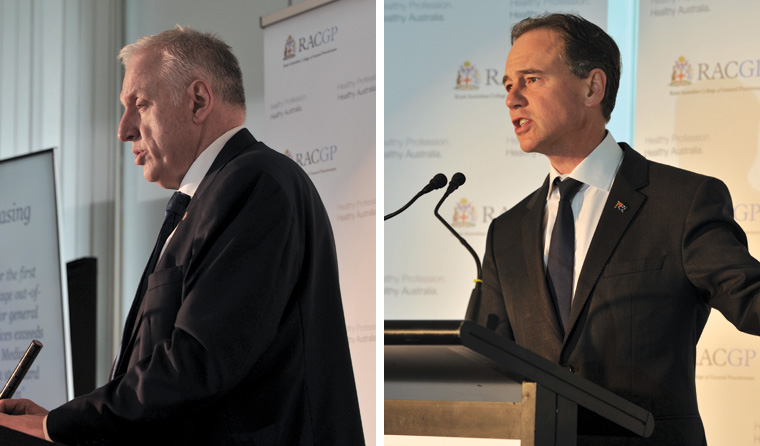News
RACGP’s Health of the Nation reveals state of general practice
Australia’s primary healthcare system continues to thrive but there are also areas of concern, particularly with regard to GP wellbeing.
 GP self-care was revealed as a major focus area of this year’s RACGP Health of the Nation report.
GP self-care was revealed as a major focus area of this year’s RACGP Health of the Nation report.
The 2019 General Practice: Health of the Nation report was launched by RACGP President Dr Harry Nespolon at Parliament House in Canberra this week, with key healthcare decision-makers Federal Health Minister Greg Hunt, Shadow Health Minister Chris Bowen, and Greens leader Richard Di Natale in attendance.
The report highlights the main reasons patients see their GPs, as well as how they interact with the primary health system. It also points to the main challenges GPs face and what must be addressed to ensure Australians can access the care they need, when they need it.
While alluding to the difficult task GPs face every day on the frontline of the healthcare system, Dr Nespolon said there is still much to be positive about regarding primary care in Australia.
‘As a GP I know that keeping a person healthy isn’t always easy, and keeping a nation healthy is an incredibly complex task,’ he said.
‘Almost 90% of the Australian population sees a GP at least once a year, with more than two million GP visits every week. Our mission is to keep people healthy and out of hospital.
‘If Australian general practice was one of my patients I would have many positive things to say, but also some suggestions on how to change course to improve overall health outcomes.’
Dr Nespolon highlighted GP wellbeing and self-care, a special area of focus in this year’s report, as requiring significant attention. In particular, this year’s General Practice: Health of the Nation found GPs are avoiding or delaying seeking their own healthcare for a range of issues, in part due to concerns about being reported to regulatory bodies.
‘We know that healthier doctors will equal a healthier population. It’s vital to ensure our GPs are getting the care and support they need so they can continue to provide the best possible healthcare to all Australians,’ he said.
‘Research shows that doctors experience higher levels of mental distress than the general population. Yet four in 10 GPs report that they have personally delayed seeking treatment or care in the past two years.
‘Part of this can be attributed to time constraints, but some doctors also feel uncomfortable seeking care from other GPs.’
The other contributing factor, according to Dr Nespolon, is
mandatory reporting.
‘With the exception of Western Australia, all of Australia’s states and territories require doctors to
report their colleagues if they believe patient safety is at risk, and this includes if a colleague has sought their help as a patient,’ he said.
‘Almost one in 10 GPs surveyed indicated they had delayed seeking care for their own health because they were worried about being reported to regulatory bodies.
‘
We believe doctors should be exempt from mandatory reporting so they feel free to discuss their health issues confidentially.’
The report also states GPs need more support to help treat the high proportion of patients they see with mental health issues.
Nearly two thirds of respondents said psychological ailments are one of the three most common conditions they deal with on a daily basis –
more than any other issue. However, this is not reflected in the way Medicare remunerates GPs for the longer consultations required to appropriately treat these ailments, to the detriment of both patient and doctor.
‘If you have a depressed patient thinking of suicide, we need more than 20 minutes but there is no rebate for a 40-minute mental health consultation,’ he said.
‘There is no reason why people with significant mental illness should be disadvantaged or GPs should be made to act as a charity to treat these patients.’
 RACGP President was joined by key healthcare decision-makers, including Federal Health Minister Greg Hunt, at the launch of General Practice: Health of the Nation.
Medicare rebates
RACGP President was joined by key healthcare decision-makers, including Federal Health Minister Greg Hunt, at the launch of General Practice: Health of the Nation.
Medicare rebates remain the top health policy issue for GPs, with the cost of providing care increasing year on year and not being matched through appropriate health funding.
The lack of funding has contributed to out-of-pocket costs that are increasing at double the Consumer Price Index, with the average patient cost now higher than the rebate for a standard general practice consultation. As a result, 14% of patients who delay a GP visit do so because of cost concerns.
Meanwhile, the fact a large amount of general practice work is unfunded has led to a
growing trend of medical graduates choosing other medical specialities over general practice. The reduced numbers have contributed to a decline in the proportion of services bulk billed
outside of major cities.
GP wellbeing Health of the Nation mental health
newsGP weekly poll
Within general practice, do you think there are barriers to providing flu vaccinations? If so, what are they?